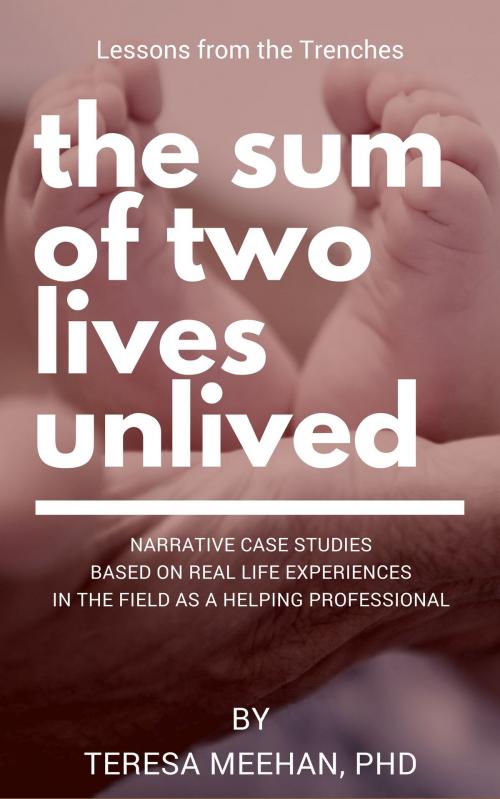The Sum of Two Lives Unlived: Lessons from the Trenches Case Studies Series
Nonfiction, Social & Cultural Studies, Social Science, Human Services, Health & Well Being, Medical, Ailments & Diseases, Mental Health| Author: | Teresa Meehan | ISBN: | 9781370195763 |
| Publisher: | Teresa Meehan | Publication: | September 5, 2017 |
| Imprint: | Smashwords Edition | Language: | English |
| Author: | Teresa Meehan |
| ISBN: | 9781370195763 |
| Publisher: | Teresa Meehan |
| Publication: | September 5, 2017 |
| Imprint: | Smashwords Edition |
| Language: | English |
The purpose of this case study series, Lessons from the Trenches, is to bring to life some of the vulnerabilities of the human experience and start a discussion about how we can best contribute to a movement of compassionate intervention. The hope is that individuals who are interested, in training, or working in the helping fields, will read through the case studies and notice the dynamic interchange of emotions that occurs between all of the participants, patients and professionals alike. So often in early training programs in the human services fields, major emphasis is placed on teaching students they must learn to set aside their personal beliefs, values and emotions when helping others. While this is an admirable goal, it is not always realistic nor is it always helpful. What is most important is learning to recognize the emotions in yourself and in others to foster meaningful connections through empathy and compassion.
After each case study presentation, there are two follow-up sections. The first one, “Lessons Learned,” highlights at least one particular area of the case that stands out as informational, transformational or both. One advantage to working in the field is that new experiences provide the foundation for new insights. Sometimes we learn about details and facts relevant to the event that we either didn’t know before, or never thought to apply to various situations. Often times, we observe things or experience emotions that are transformational not only because they contribute to personal growth as a helping professional but they often challenge us to move forward on our spiritual paths.
The second follow-up section, “Thought Questions,” are intended to provoke further inquiry and discussion. They are not intended to be all-inclusive. The best way to learn from case studies is to ask all the “why” questions you can imagine because any and all eventualities are possible in the trenches.
Finally, in reading these case studies, the hope is that you will gain a new appreciation for what it means to be vulnerable. Every situation can always be handled a hundred different ways, but you don’t know exactly how you will manage until you are face-to-face with a crisis in the trenches. There is always a dynamic interchange that occurs between the participants that can never be adequately predicted. This is why the first goal of a helping professional should be to gain the skills necessary to provide compassionate intervention.
The purpose of this case study series, Lessons from the Trenches, is to bring to life some of the vulnerabilities of the human experience and start a discussion about how we can best contribute to a movement of compassionate intervention. The hope is that individuals who are interested, in training, or working in the helping fields, will read through the case studies and notice the dynamic interchange of emotions that occurs between all of the participants, patients and professionals alike. So often in early training programs in the human services fields, major emphasis is placed on teaching students they must learn to set aside their personal beliefs, values and emotions when helping others. While this is an admirable goal, it is not always realistic nor is it always helpful. What is most important is learning to recognize the emotions in yourself and in others to foster meaningful connections through empathy and compassion.
After each case study presentation, there are two follow-up sections. The first one, “Lessons Learned,” highlights at least one particular area of the case that stands out as informational, transformational or both. One advantage to working in the field is that new experiences provide the foundation for new insights. Sometimes we learn about details and facts relevant to the event that we either didn’t know before, or never thought to apply to various situations. Often times, we observe things or experience emotions that are transformational not only because they contribute to personal growth as a helping professional but they often challenge us to move forward on our spiritual paths.
The second follow-up section, “Thought Questions,” are intended to provoke further inquiry and discussion. They are not intended to be all-inclusive. The best way to learn from case studies is to ask all the “why” questions you can imagine because any and all eventualities are possible in the trenches.
Finally, in reading these case studies, the hope is that you will gain a new appreciation for what it means to be vulnerable. Every situation can always be handled a hundred different ways, but you don’t know exactly how you will manage until you are face-to-face with a crisis in the trenches. There is always a dynamic interchange that occurs between the participants that can never be adequately predicted. This is why the first goal of a helping professional should be to gain the skills necessary to provide compassionate intervention.















